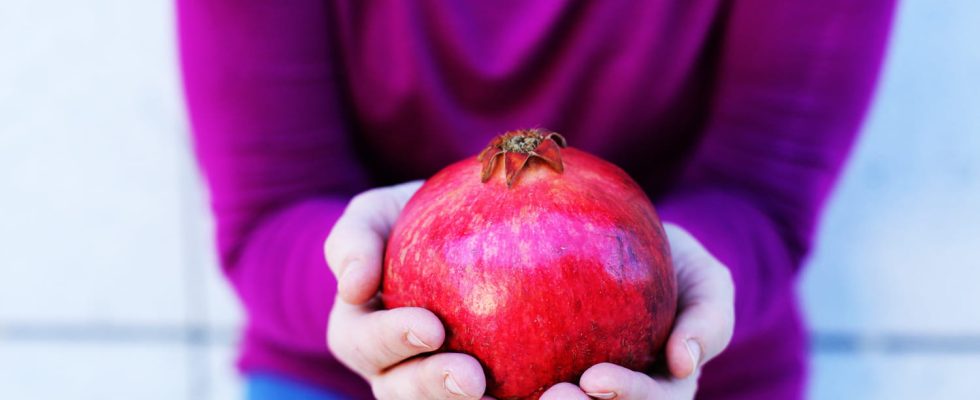Anti-inflammatory, rich in vitamin C… Pomegranate is an essential autumn fruit. Here’s how to enjoy the benefits of its small, juicy and sweet seeds.
From September to December, it is pomegranate season ! Originally from the Middle East where it has been cultivated for thousands of years, the pomegranate is a fruit highly appreciated for its tangy and sweet tasteher rich in nutrients and his medicinal properties.
What are the health benefits of pomegranate?
This red-skinned fruit apple-shaped, which contains small juicy seedsEast made up of more than 80% water which gives it virtues thirst-quenching.
► Against premature aging : “But she is especially rich in antioxidants, and in particular polyphenols, such as anthocyanins and tannins, explains Anne-Gaël Florand, specialized in Ayurvedic medicine. These compounds help protect the body’s cells from damage caused by free radicals, helping to reduce the risk of chronic diseases.”
► Against pain. The pomegranate displays anti-inflammatory properties which can help reduce inflammation in the body. “It may be beneficial for conditions such as arthritis and others inflammatory diseases.”
► For the heart and arteries. Regular consumption of pomegranates can help maintain a healthy heart. “The antioxidants and anti-inflammatory compounds in pomegranate help to reduce blood pressurehas improve cholesterol levels and prevent plaque buildup in the arteries. continues our interlocutor.
Pomegranate fiber stimulates transit and prevents constipation
► Anti-cancer? Some studies also suggest that polyphenols and tannins in pomegranate juice have been associated with a reduction in the risk of certain types of cancer (especially that of the prostate and breast), by inhibiting the growth of cancer cells thanks to its anti-inflammatory effects. “It is not never bad to regularly drink this juice or take these extracts since we have or are at risk of having prostate cancer, breast cancer or hormone-dependent female cancer” wrote it Professor David Khayat in his book “Preventing cancer, it also depends on you” published by Odile Jacob.
► Rich in vitamin C. It is a fruit rich in vitamin C (9mg/100g raw pulp and seeds), which strengthens the immune system and helps fight infections.
► Rich in fiber. “The fiber present in pomegranate promotes good digestive health by stimulating intestinal transit and preventing constipation.”
► For the skin. Finally, the pomegranate is also a cosmetic ally since “its antioxidants can help maintain healthy skin by fighting free radical damage and by promoting cellular regeneration”.
“It is preferable to consume the fruit fresh or its natural juice, rather than processed products containing added sugars” insists our interlocutor. We must favor “pure juice“pomegranate and organic, ideally. Relatively low in caloriespomegranates can be eaten fresh as is, or added in sweet or sweet/savory salads.
“Pomegranate seeds go very well as a topping on yogurt”
“Pomegranate seeds also go very well with cereals in the morning, as a topping for yogurt or ice cream/sorbet.” They are also easy to use in sauce (with honey, garlic and spices)in jam, in coulis, in vinaigrette, in spread (with garlic, lemon, olive oil, herbs, etc.), in ice cream, in sorbet and even in cocktails! “Note that pomegranate seeds can be frozen. Have fun make ice cubes with !”
How to use it for the skin?
► In oil: Pomegranate seed oil can be applied to dry skin to moisturize it. “She is rich in essential fatty acids and vitamins, which can nourish and soften the skin.”
► As a mask: “Mix some pomegranate juice with honey, yogurt or claysuggests Anne-Gaël Florand. Apply this mixture to your face, leave for 15 to 20 minutes then rinse with lukewarm water. This can help hydrate, rejuvenate and revitalize your skin.”
► By exfoliating: “Mix the seeds with yogurt or olive oil to create a gentle scrub for the face or body.”
Before applying pomegranate to the skin, do a test to ensure that we do not make any allergic reaction. “Also, avoid leaving pomegranate juice in contact with the skin if you have cuts or scrapes because he can cause a tingling sensation.”
Thanks to Anne-Gaël Florand, specialized in Ayurvedic medicine and member of the Médoucine network.
